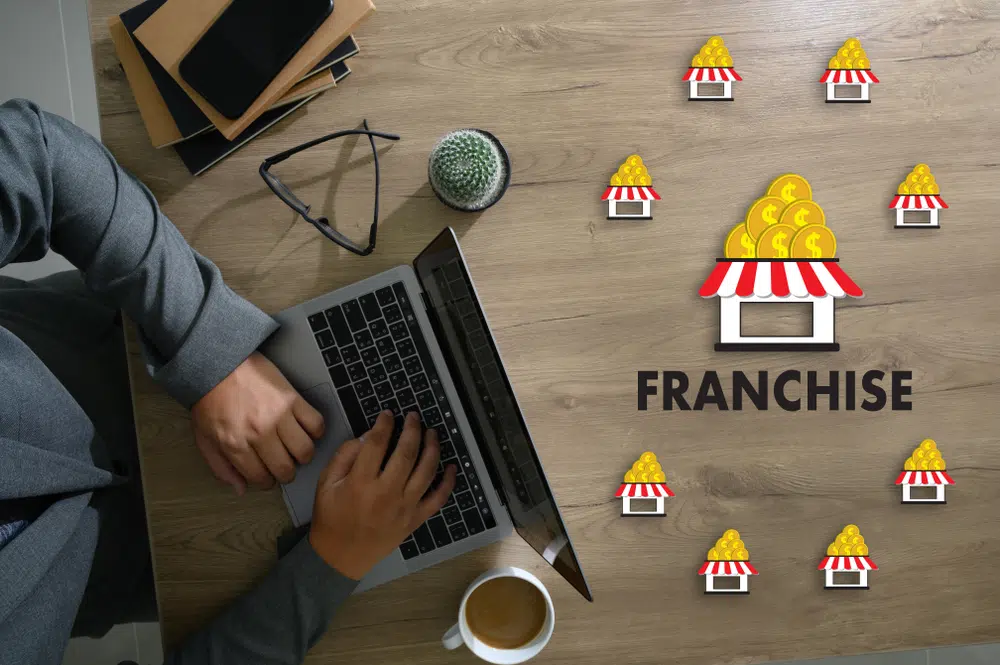
This should include your financial projections, as well as a marketing strategy. You’ll also need to have a good understanding of the franchisor’s rules and regulations. Finally, it’s important to remember that buying a franchise is a long-term commitment. Be sure you’re prepared to make the necessary financial and time commitments before signing on the dotted line.
With careful planning and due diligence, buying a franchise can be a great way to start your own business with a franchise, you don’t have to start from scratch when you start your own business. The franchisor (the company that offers the franchise) offers experience and support based on a tried and tested formula.
There are both advantages and disadvantages to buying a franchise. It is crucial to carefully weigh up the franchise opportunity and any costs that are attached to it.
Franchising advantages
Franchises are usually based on proven business models
- Essentially, you are copying an idea the franchisor has already proven to be successful.
- Existing franchisees can tell you whether the business works.
- Franchisors should continuously research and update their business ideas.
A well-known brand name may be available to you
- When customers are familiar with the brand, it can be easier to sell them.
- Whenever the franchisor conducts a national promotion, you will benefit. However, additional fees are often required to fund this.
- Any trademarks owned by the franchisor will also be yours to use.
You will receive full support from a good franchise operation
As a general rule, this includes:
- The training usually includes both general business skills (e.g., book-keeping) and specific business skills
- Establishing a business, such as finding suitable premises
- A detailed operations manual that explains how the business is run
- Support and advice on an ongoing basis
Franchise rights are almost always exclusive to you
- An exclusive client base or a certain region, for example.
- Other related businesses will still compete with you.
Financing the business is likely to be more straightforward
- Franchises with a good reputation are easier to get financing for than unproven start-ups.
- Pre-built bank relationships enable some franchisors to assist you in borrowing funds.
- Start-up financing may be available through local enterprise initiatives.
Franchising disadvantages
The initial start-up costs may be higher than expected
- In order to buy a franchise, you have to pay a fee (often £5,000 to £10,000, but it can cost up to £250,000).
- In addition, you have to pay for your business’s usual expenses (premises, equipment, stock, etc.). You may have to purchase some of these items from the franchisor.
- Royalties or management fees are payable on sales. Payments can be fixed amounts or percentages of sales, or a mixture of both. Profit or not, you must make the payment.
- There may be a separate charge for some extra costs. The franchisor may contribute to your training fees or advertising costs.
- If you are considering becoming a franchisee, you need to make sure that the franchisor’s services will justify all these costs.
You have to agree to operate within certain limits
- You will usually be restricted in what you can do by the franchisor’s contract.
- The business cannot be changed. New products cannot be introduced to suit your local market, for instance.
- The franchisor must approve the buyer before you can sell your franchise.
You are exposed to risks which are outside your control
Among them are:
- Lack of support from the franchisor (for example, advertising or training)
- A franchisor going out of business
- If the franchisor is sold to a new owner who changes the operation or is simply more difficult to work with
- A bad reputation given to the brand by the franchisor or other franchisees
Types of business arrangement
A business format franchise offers a full business blueprint
- Business format franchises are some of the most successful franchises. They have all the advantages and the disadvantages associated with a full franchising relationship.
- Burger King and Prontaprint are two examples.
Many other franchise types offer a less complete package
For example:
- Dealerships and distributorships. Although you have an agreement to sell the product, you do not normally trade under the franchise name and have more freedom to run the business.
- As a supplier’s agent, you sell goods.
- The licensor’s product can be made and sold by you without restrictions on how you run your business.
Multi-level marketing is sometimes regarded as a form of franchising
- The self-employed distributor sells goods on behalf of a manufacturer, earning commissions on their own sales and those of the secondary distributors they have recruited.
- This type of arrangement is often difficult to make a good return from, unless you recruit many other distributors.
- This type of arrangement is governed by special regulations.
Evaluating a franchise
The franchisor should provide an information pack
- There are answers to all the basic questions in this prospectus.
- Franchise award manuals are often provided by top franchisors. It contains all the information needed to conduct due diligence after an initial interview and confidentiality agreement.
- You shouldn’t take everything at face value. Make sure the franchisor’s claims are true and that they will remain so (see Final reality checks).
Do as much research as possible
- When considering buying a franchise, gather information from a variety of sources.
- If you were starting your own business from scratch, make sure you know as much as you can about the industry and the market.
- Consult your bank. Banks usually have franchise specialists who can provide information and advice.
- Read the trade press such as Franchise World and Business Franchise. Franchisor directories may be available in your business library.
- Attend franchise exhibitions.
- A consultant may be able to help you. Franchise consultants develop franchise packages on behalf of franchisors.
- Agents who sell franchises should be avoided. Franchises are usually sold by good franchisors themselves.
Get enough detail to give you a broad understanding of the business concept
- What is the business?
- What are the trading locations or territories offered?
- Who are the competitors? An effective franchisor should assess the competition realistically.
- In order to update the business concept, what steps does the franchisor take?
Find out about the franchisor
- How long has the business been in operation?
- What is the company’s history as a franchisor? Many franchisors are members of the British Franchise Association. If your company is not a member, why not?
- How much experience and accomplishments do the key people have?
- What is the financial strength of the franchisor? Get a bank reference and three years’ audited accounts.
- What is the number of franchisees in the UK? It shows that the concept is not well tested in the UK if all its franchisees are abroad. Find out how the concept has been tested. What are the reasons for not having done so?
- What is the failure rate of franchisees? Find out why certain past failures occurred.
- What is the independence of the franchisor? Check what the original owner’s rights are if the franchisor is a UK licensee of a US company (for example, if the franchisor is the UK licensee of a US company).
Check how much support you will receive
- At the beginning, what kind of training is provided? Selling skills are crucial for some franchises.
- Can you get help setting up the business? The franchisor may provide advice on the premises and equipment you need, legal assistance (e.g., with planning permission), and so on.
- Is there any ongoing support provided? Depending on your needs, this can range from nearly nothing to full support, including holiday coverage.
- Is it possible to get help when you need it? You may be able to contact the franchisor’s support staff whenever you need assistance.
- Do you receive market research from the franchisor? This can help you keep up with national trends, new competitors, etc.
Check the terms of the franchise agreement
- Generally, franchise agreements last for five to ten years. You may be able to renew your franchise after this period.
- For the entire term of the franchise, will you have exclusive rights in your area?
- When you want to sell the franchise, what conditions and restrictions apply?
- If you die or are unable to continue the business, what will happen?
Franchise costs and returns
What are the costs?
- What is the up-front fee? Royalty payments from successful franchises are usually the main source of profit for good franchisors. Initial fees should only reflect the costs of franchise development and administration.
- What is the required investment? Make sure the franchisor’s figures include realistic costs.
- What is the royalty percentage?
- How much does the franchisor charge for materials and services (e.g., stock)? Prices may be marked up by the franchisor. It is also possible to take advantage of the franchisor’s purchasing power.
- Are there any other charges (e.g., promotion, training)? Make sure you know exactly what you’re getting.
What financial performance can you expect?
- How much return do existing franchisees actually achieve? There is a possibility that the earliest franchises may have cornered the easiest or most profitable territories.
- Is there a projected return on investment for new franchises? It is probably unrealistic to expect very high profits from a small investment.
Final reality checks
Before committing to a franchise, make sure you completely evaluate it.
Visit the franchisor
- If there is anything unclear in the prospectus, ask specific questions.
- How honest and open seem the people to be?
- Is the franchise salesperson trying to sell you too hard? You should not rush into making a decision.
Get a sample contract for your lawyer to examine
- You should not make any non-refundable deposits or part with money until a lawyer has reviewed the draft agreement.
- A franchise agreement should never be entered into without legal advice.
- Consult a franchise lawyer. It is common for large firms to have a specialist, while smaller firms may have individuals with relevant expertise.
Visit at least two franchisees – and phone at least three more
- By doing so, you will be able to determine what the risks and opportunities are.
- What are their impressions of the franchisor, how is their business going, and what issues are they having?
- Be sure to obtain a complete list of all current and past franchisees, including those who have failed. Franchisees who refuse to disclose this information should be avoided.
Carry out your own market research in your proposed territory
- The business must work in your area, even if it works elsewhere.
- Who are the likely customers?
- Is there any competition?
- How do the long-term prospects look?
Prepare a business plan, just as you would for any other start-up business
- Rather than relying on the franchisor’s financial projections, conduct your own market research.
- For any help you need, consult your professional advisers.
Jarred Musson is a versatile writer with a diverse educational background and a passion for all things business. Holding a Master of Science (MSc) degree in Marketing and a Bachelor of Arts (BA Hons) in Multimedia Journalism from Manchester Metropolitan University, Jarred possesses a unique blend of expertise that allows him to dissect and communicate complex business topics with clarity and precision.


